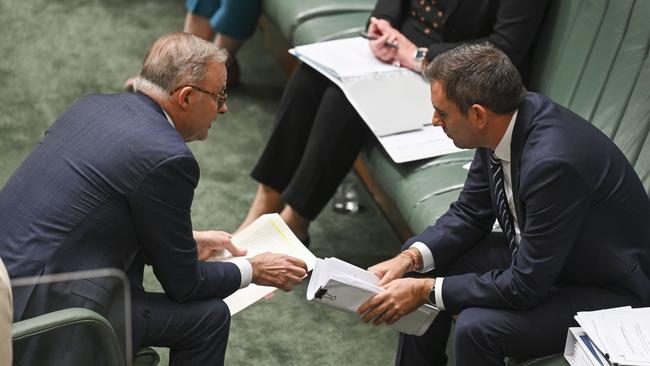Treasury review calls for tweaks to media bargaining code
Australia’s landmark news media bargaining code introduced by the Morrison government last year has been a “success to date”, a Treasury review has found.

Australia’s landmark news media bargaining code — introduced by the Morrison government last year — has been “a success to date”, a Treasury review has found.
But despite the code resulting in dozens of deals between local media outlets and Google and Facebook (now Meta), the Albanese government should consider extending its reach to encompass other digital platforms, the review has recommended.
Last year, most major Australian news media companies, including News Corp, Seven West Media, Nine and the Guardian, struck commercial deals with Google and Meta which saw them agree to pay for access to the various outlets’ news content.
The deals were reached in the wake of the introduction of the news media bargaining code, which prompted the tech titans to negotiations with eligible publishers or face significant fines.
Treasury subsequently conducted a review into the code to determine if, during its first year of operation, the code had delivered outcomes consistent with its policy objective, and to identify any potential improvements.
The review found that overall, the code has been “a success to date”, with more than 30 commercial agreements struck between news businesses and tech giants Google and Meta.
Of those, Google has reached 23 commercial agreements; Meta submitted that it has reached commercial agreements with 13 news businesses, but did not provide a list of the deals.
Submissions by media outlets to the review were mixed.
The review quoted Nine Entertainment’s submission that: “Without the introduction of
this world first legislation, Nine does not believe that many (if any) commercial agreements between the digital platforms and Australian media companies would have been made.”
The review also noted that some publishers had expressed concern about the lack of transparency relating to such agreements, while smaller outlets — such as SBS, and The Conversation — said the code had not provided sufficient incentive to Meta to engage in discussions with them.
A submission from Commercial Radio Australia also highlighted the mixed response from Australian media companies to the code.
“Much of the commercial radio industry has experienced significant difficulties in engaging Meta and Google in commercial negotiations.
“Ninety per cent of commercial radio networks have been unable to strike a deal with Google;
and 95 per cent of commercial radio networks have been unable to strike a deal with Meta.”
The review stated: “The objective of the code is to address bargaining power
imbalances so as to ensure news businesses receive fair remuneration from digital platforms for the value their content generates.
“It is not designed to redistribute resources across the news sector or to guarantee that all news businesses receive funding. Other policy and funding tools are available to
achieve these objectives, should the government wish to pursue them.”
Google submitted that it “has been approached by a number of smaller and independent publishers of niche lifestyle publications and city guides, seeking commercial deals.
“Google has engaged with those publishers over the course of several months to identify
potential opportunities for mutually beneficial commercial partnerships. In some instances, despite Google’s best efforts to put flexible offers on the table based on comparable market deals underpinned by fair value exchange, the publishers’ commercially unreasonable expectations have prevented these negotiations from progressing further.”
The review made five key recommendation, one of which concerns the “lack of a formal mechanism to extend the code to other platforms”, which may include YouTube and TikTok.
“To address this, the review suggests the government consider directing the ACCC (Australian Competition & Consumer Commission) to prepare reports on … the extent to which digital platforms make available covered news content of Australian news businesses and whether significant bargaining power imbalances exist between these digital platforms and Australian news businesses.
The review restated how under the legislation, the government may “designate” a digital platform – making them subject to the code – after considering whether there is a significant bargaining power imbalance between the platform and Australian news businesses; and whether the platform has made a significant contribution to the sustainability of the Australian news industry through commercial agreements with news businesses.
To date, the government has not “designated” any company under the legislation.
The review also recommended that the government should consider reviewing the code again “after 4 years of its operation”, in 2025.
The government is considering the recommendations of the review.



